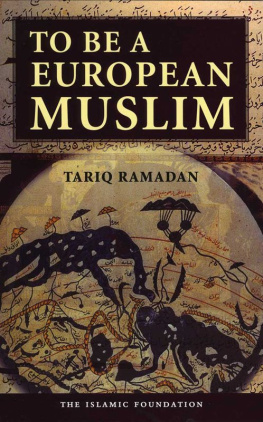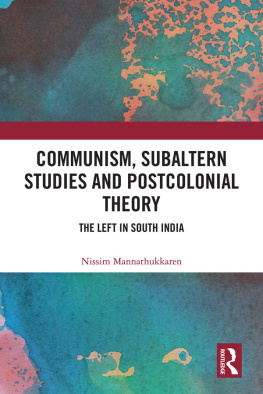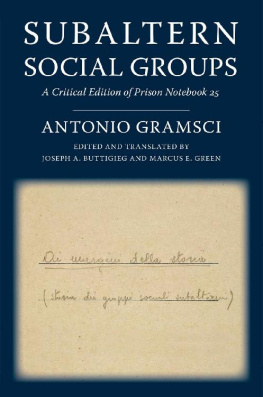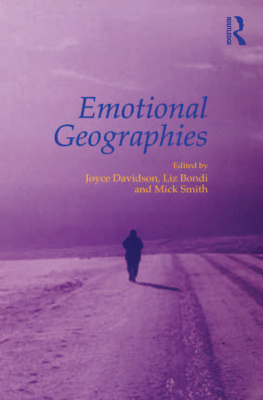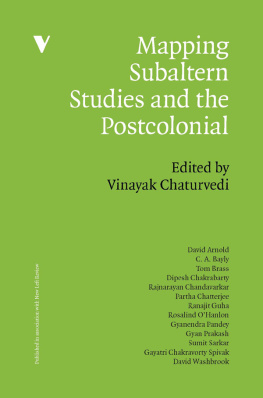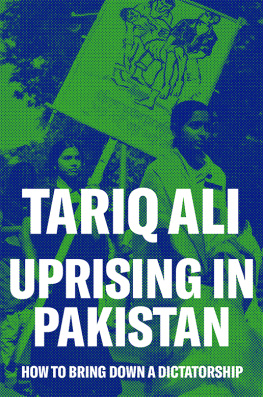Subaltern GeographiesGEOGRAPHIES OF JUSTICE AND SOCIAL TRANSFORMATION
SERIES EDITORS
Mathew Coleman, Ohio State University
Sapana Doshi, University of Arizona
FOUNDING EDITOR
Nik Heynen, University of Georgia
ADVISORY BOARD
Deborah Cowen, University of Toronto
Zeynep Gambetti, Boazii University
Geoff Mann, Simon Fraser University
James McCarthy, Clark University
Beverley Mullings, Queens University
Harvey Neo, National University of Singapore
Geraldine Pratt, University of British Columbia
Ananya Roy, University of California, Los Angeles
Michael Watts, University of California, Berkeley
Ruth Wilson Gilmore, CUNY Graduate Center
Jamie Winders, Syracuse University
Melissa W. Wright, Pennsylvania State University
Brenda S. A. Yeoh, National University of Singapore
Subaltern Geographies
EDITED BY
TARIQ JAZEEL
AND STEPHEN LEGG
2019 by the University of Georgia Press
Athens, Georgia 30602
www.ugapress.org
All rights reserved
Set in 10/12.5 Minion Pro by Graphic Composition, Inc.
Most University of Georgia Press titles are available from popular e-book vendors.
Printed digitally
Library of Congress Cataloging-in-Publication Data
Names: Jazeel, Tariq, editor. | Legg, Stephen, editor.
Title: Subaltern geographies / edited by Tariq Jazeel and Stephen Legg.
Description: Athens, Ga. : University of Georgia Press, 2019. | Series: Geographies of justice and social transformation | Includes bibliographical references and index.
Identifiers: LCCN 2018042679| ISBN 9780820354590 (hard cover : alk. paper) | ISBN 9780820354880 (pbk. : alk. paper) | ISBN 9780820354606 (ebook)
Subjects: LCSH: Developing countriesSocial conditions | Developing countriesGeography. | PostcolonialismDeveloping countries.
Classification: LCC HN980 .S79 2019 | DDC 306.09172/4dc23 LC record available at https://lccn.loc.gov/2018042679
CONTENTS
TARIQ JAZEEL AND STEPHEN LEGG
DAVID ARNOLD
MUKUL KUMAR AND ANANYA ROY
JO SHARP
DAVID FEATHERSTONE
SARAH A. RADCLIFFE
VINAY GIDWANI AND SUNIL KUMAR
ANNA F. LAING
SHARAD CHARI
COLIN MCFARLANE
ACKNOWLEDGMENTS
This volume emerges from two sessions co-organized by us at the 2014 annual conference of the Royal Geographical Society (in conjunction with the Institute of British Geographers). While the conference has regularly hosted sessions on colonialism or imperialism, we felt that it had neglected discussions of nonhege-monic understandings of space, descriptions and analyses of subaltern forms of dwelling- and space-making, and examinations of the craft and skill required to engage subaltern archives or groups. We would like to thank all those involved in making those sessions happen, including Thomas Cowan, David Feather-stone, Vinay Gidwani, Colin McFarlane, Jenny Robinson, and Jo Sharp, as well as the many who attended those sessions and joined in the subsequent discussions. We would also like to thank the RGS-IBGS Historical Geography Research Group and the History and Philosophy of Geography Research Group for sponsoring these sessions.
David Arnold, Sharad Chari, and Vinay Gidwani gave us valuable feedback on the introductory essay in this book, for which we are both extremely grateful. One of the most valuable lessons we take from subaltern studies is the significance of collaboration, shared learning, and the importance of benefiting from the situated knowledge of others. Our contributors have been, and we know will continue to be, model collaborators. They have taught us much more than we can hope to reciprocate. We thank them sincerely for their patience and diligence.
We would also like thank the editors of the Geographies of Justice and Social Transformation series at the University of Georgia Press, Nik Heynen, Sapana Doshi, and Matthew Coleman, whose enthusiastic support for this project has been crucial and invaluable. Our editor Mick Gusinde-Duffy has helped us see the manuscript through a meticulous review process, and through it all has been kind and available and a pleasure to work with. We also thank the manuscript reviewers for their belief in this manuscript, as well as their critical engagements and provocations to always go just that bit further in our delineations of the intersections between subaltern studies and critical geography. We thank Magnum Photos/Raghu Rai for permission to reproduce the cover image, a section from Rais photograph of Chawri Bazar in Old Delhi, taken in 1972.
Steve completed much of the work on this volume during a British Academy Mid-Career Fellowship, for which he is extremely grateful. Tariq has benefited from a period of sabbatical leave from University College London (UCL), which has helped greatly in the production of this book.
Coediting and coauthoring is an exercise of coproduction and coexistence, in this case lasting over five years. Steve would like to thank Tariq for pushing him to read more, think more, and find ever-new perspectives from which to think about his privilege, how he writes, and why. And for making him laugha lot. Tariq would like to thank Steve for being a lesson in intellectual care, acuity, and generosity, for his careful yet creative eye, and not least for his warmth, enthusiasm, and compassion through a period in which life, as much as our collective thinking, has taken its course. He would also like to thank Steve for laughing at his jokes.
This is a project born of the best kind of collegiality. Friendship.
Subaltern GeographiesSubaltern Studies, Space, and the Geographical Imagination
TARIQ JAZEEL AND STEPHEN LEGG
There is no conquest that has only one story to it. It is made up of at least twoone narrated by the conquerors and the other by the conquered. Foil to the story of that steamship sailing into darkness, there is another being told beyond the point where the civilization of hunters, traders, explorers, and colonizers stops and the jungle begins. We have no clue to its content. The most a narratology of the civilized can do, using all the sophistication of its craft, is to acknowledge it by a rhetoric of incomprehension: eyes which glow in the bush as evidence of a numerous but unseen presence; the gathering and dispersal of shadows there after the logic of some mysterious movement; voices which drone like chants, rise like cries, and die back into silence signifying nothing; and the drums: At night sometimes the roll of distant drums behind the curtain of trees would run up the river and remain sustained faintly, as if hovering in the air high over our heads, till the first break of day. Whether it meant war, peace or prayer we could not tell (HOD, 68; my emphasis).
Ranajit Guha (2009b, 387)
Joseph Conrads Heart of Darkness (1899) stands as one of the most iconic tributes to, and flawed critiques of, the colonial enterprise. It sits at the center of the founding text of postcolonial studies, quoted as an insignia at the beginning of the final chapter, Orientalism Now, of Edward Saids landmark book Orientalism (1978). It was also the text Said turned to in his influential meditations on the relationships between geography and empire, recalling the narrator Marlows passion for maps and their potential to dignify conquest with an idea (Said 1978, 216). For Ranajit Guha, the founder of the Subaltern Studies Collective, the





